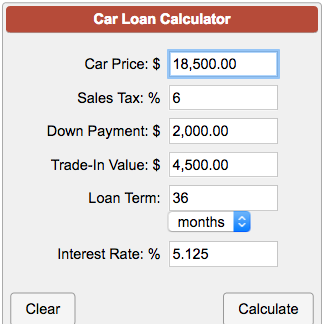


#Calculating car payment free
If you buy a brand-new car, the manufacturer or dealership might include free oil changes and other maintenance services for a certain period. Repairs and MaintenanceĪll cars require maintenance and repairs, so it's important to budget for the associated costs. You can get a rough estimate of what you'll pay, which you can use when creating a car budget. You might qualify for a lower rate with one company based on its calculation formula.īefore you estimate how much your car insurance will cost each month, it's helpful to request a few quotes from various insurance companies. Additionally, not all insurance companies place the same weight on each factor. Some states restrict the factors insurance companies can use when calculating rates. Most insurance companies base the cost on several key factors: The exact coverage requirements vary by state, but you can look up what your state requires to get an idea of what you'll have to spend to insure your vehicle.
#Calculating car payment drivers
Every state has laws that require drivers to maintain certain minimum coverage amounts. Car InsuranceĪnother expense that comes with owning a car is automotive insurance. If you live in a part of the country where the cost of living is higher than average, you might want to budget on the high end, because fuel costs could go up. Gas prices fluctuate, but you can look at averages in your area and plan accordingly. These include repairs, maintenance, fuel, and insurance costs, and you must pay them in addition to your car loan payment. Calculating Total Car Expensesīefore you decide on a car, it's helpful to sit down and calculate how much the other expenses might be each month. If you find a cheaper model that works for your needs, it's always smart to save any extra money you earn for the future.
#Calculating car payment full
Of course, you don't have to spend the full 10% of your monthly earnings on a car. Based on the 10% recommendation, you could reasonably afford to pay around $416 for a car payment each month. When calculating the total you can afford to spend on vehicle expenses each month, aim for around 20% of your take-home income.įor example, if you bring home $50,000 per year after taxes, your monthly take-home pay is probably around $4,167. This percentage doesn't include all the expenses that come with car ownership, such as automotive insurance, fuel, maintenance, parking, and repairs. Most financial experts recommend spending no more than 10% of your monthly take-home pay on a car. Ready to purchase a car? Easily compare auto lenders below. When you start comparing options, you might find that cars are more expensive than you realized.Īs the prices of both new and used cars continue to increase, you might ask, how much car can I afford? Before you buy, review this helpful guide that outlines how much you can afford to spend on a monthly payment, as well as tips to bring the cost down. Doing so can also feel overwhelming and confusing. Buying a car is an exciting step in a person's life, especially for first-time car owners.


 0 kommentar(er)
0 kommentar(er)
